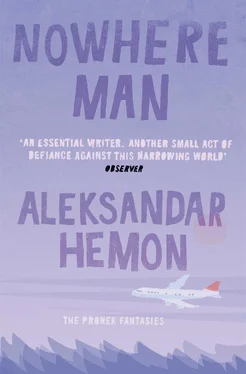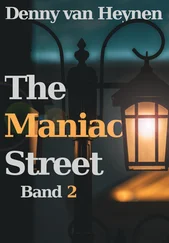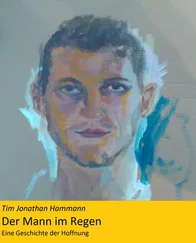I needed the job. I calculated: if I got a thousand dollars a month, I could pay the March rent, and a part of the April rent right off, and then buy a mattress for fifty dollars or so. I had butterflies in my stomach, ripping off one another’s wings, biting viciously through one another’s abdomens. The lawn in front of Ort Institute had spring sores. Over the bushes a fleet of gnats hovered, still dizzy from a long slumber, deciding what to do: settle for the lumpengreenness of the bushes, or fly into a windshield and end it all with a splatter.
The receptionist was a slender woman, thickly made up, as if she had never unmade herself up, had just kept adding layers and layers. “Take seat,” she said, pouted and narrowed her eyes, as if suspicious of me. I sat on an ochre sofa, and as I landed a nickel leapt up at me from the other end of the sofa, so I pocketed it. The receptionist talked over the phone, her lips so close to the mouthpiece that she smudged it with lipstick, glancing at me all along, as if she were describing me: he was tall and chunky, a cubical head, not very well dressed, spoke with an Eastern European accent, a scar stretching across his throat. Across the hall, there was a menorah on a pedestal, at the foot of which there was an inscription in Hebrew. From somewhere beyond the menorah, I could hear a discordant choir chanting, I could hear rigid consonants and willowy vowels:
I have never read Moby-Dick.
I have never seen the Grand Canyon
I have never been in New York.
I have never been rich.
The walls were pale brown, and the carpets were dispirited brown, and the woman who walked toward me was leaning forward, moving fast. She briskly halted, stretching an invisible leash to the end. “Hi!” she said. “I am Robin.” She spoke in a belabored warbly way, eager to be liked, but sensing that the chances were slim. I introduced myself, and then got off the sofa quickly, so I could catch up with her. We passed an announcement board with leaflets in Russian and handwritten notes. There were doors suggesting dark basements, and there were chaotic footprints, as if somebody had danced drunk in muddy boots. Robin flew down the hall and flung open a door, then stood waiting for me to enter it. Her eyes were one size too big for her face, which was embroidered with gullies filled to the brim with powder. In a flash, I recognized how ludicrous my hope was, how comfortably everything was beyond the reach of my will. “Come on in, and take a seat,” she said. “I am going to get Marcus.”
I did not know who Marcus was, but I walked into the room; it smelled of sharpened pencils and paper glue and Robin’s perfume and burnt coffee and chalk. On a round table there was a nightmarish chain of cup rings and a coffee cup (the possible culprit) next to an abandoned dictionary.
There was a pile of newspapers on the table, the front page facing me: DEFENSES COLLAPSE IN GORAZDE. When I was thirteen I had spent the summer at a seaside resort for Tito’s pioneers and fallen in love with a girl from Goražde. Her name was Emina, and she taught me to kiss using my tongue, and she let me touch her breasts — she was the first girl I had ever touched who wore a bra. U.S. SEIZES BOAT CARRYING 111 IMMIGRANTS, a headline read. My palms were sweating, my fingertips moist, and the paper smudged up my whorls, making them visible. I had once read a pulp novel in which there was a genius criminal, the notorious King of Midnight, who had altered his fingertips, but the master detective recognized him by his distinctive voice. The ceiling fan revolved on the coffee surface, slightly curved. Someone named Ronald “Ron Rogers” Michalak had died — he was the beloved husband of the late Patricia. Sunny skies warmed most of the nation. The Bulls bowed, but did not look back. Chicago Jews celebrated Passover.
A woman opened the door and stepped in, still holding the door with her left hand, as if ready to escape. “Is Robin around?” she asked. The sleeves of her blue shirt were rolled up and I could see the sinews on her forearms tighten, fighting off the weight of the door.
“No,” I said. “She went to find Marcus. I am waiting for her too.”
“I’ll just come back later,” she said, and turned around, and I recognized the back of her head: the edge of her blue collar, and a lean neck with a feathery vine growing toward the mainland of her hair and the gentle twirl on her pate — she had been on the train too, sitting in front of me. I could see the wings of her earrings on the insides of her earlobes, and stray hairs touching the tips of her ears as she slipped out. MASSACRES RAGE ON, a headline read. BODIES PILE UP IN RWANDA.
Robin seemed to have oversized glass marbles instead of eyeballs, like a doll — she was either not blinking or she was blinking when I was blinking. Her eyelashes bent abruptly upward, like little scythes. Marcus was puckering his upper lip so his mustache hair could touch his abundant nostril hair, as if forcing them to couple. He looked at me cautiously, his hands comfortably placed on his belly ledge.
“Do you have any previous teaching experience?” Robin asked.
“No,” I said. “But I have huge learning experience.”
“These people can be demanding,” she said. An ambulance passed down the street chirruping hysterically.
“This job,” Marcus said, with a scrupulously nasal voice, “requires patience. Petulance just would not do it.”
Robin glanced at him, frowned and blinked, but then restored her grimace of befuddled doll. I had no idea what “petulance” meant, and the dictionary was beyond my reach.
“What is your point of origin?” Marcus asked.
“Sarajevo, Bosnia,” I said.
“Oh, man,” Robin said. “That is so neat.”
“I spent years studying other cultures,” Marcus said. He stood up and walked toward me; he had a squash-shaped body, with the small, narrow feet of a ballet dancer. He leaned toward me and whispered: “I used to work for the government.”
“Really,” I said. Robin’s perplexion was flaming now — her cheeks ruddy, burning through the blanket of makeup.
“Yes. In the NSA, the DLI, the Slavic languages section, translating all kinds— all kinds —of information,” Marcus said. “I can peruse seventeen languages.”
“Wow!” Robin said.
“ Dobar dan! ” Marcus said.
“ Dobar dan! ” I replied.
“ Da li je ovo zoološki vrt? ”
“Holy moly!” Robin said. “What does that mean?”
“Good day. Good day,” I translated. “Is this the zoo?”
Someone knocked and peeked through the door and said: “Teacher, I can talk to you?”
“Not now, Mihalka,” Robin said. “Wait outside.”
“It is a must,” Mihalka said.
I turned around and looked at him: his head was ascetically shaved, his scull scarred, and his face punched in by an immense force, as if he had been a boxer. A mountain ridge of wrinkles rose across his forehead. He reminded me of my uncle, who lived in Canada now, working as an exterminator.
“Just wait outside, Mihalka,” Robin said.
“Some of them possess scintillating minds, and some have rather perplexing personalities,” Marcus said.
“I am sorry,” I said. “I do not understand everything that you say.”
“He is from Czechoslovakia,” Robin said. “You are from Czechoslovakia too, right?”
“He is from Yugoslavia,” Marcus said. “It’s a wartorn country.”
“I am from Bosnia,” I said.
“You know,” Marcus said, “I was on a mission in Bosnia once. I met some brave men and beautiful women there.”
“When was that?” Robin asked, and rubbed her temple. The skin on it wrinkled and unwrinkled under her finger, the pain still untouched. It must have been taking a lot of strength to maintain the expression of permanent bafflement.
Читать дальше












